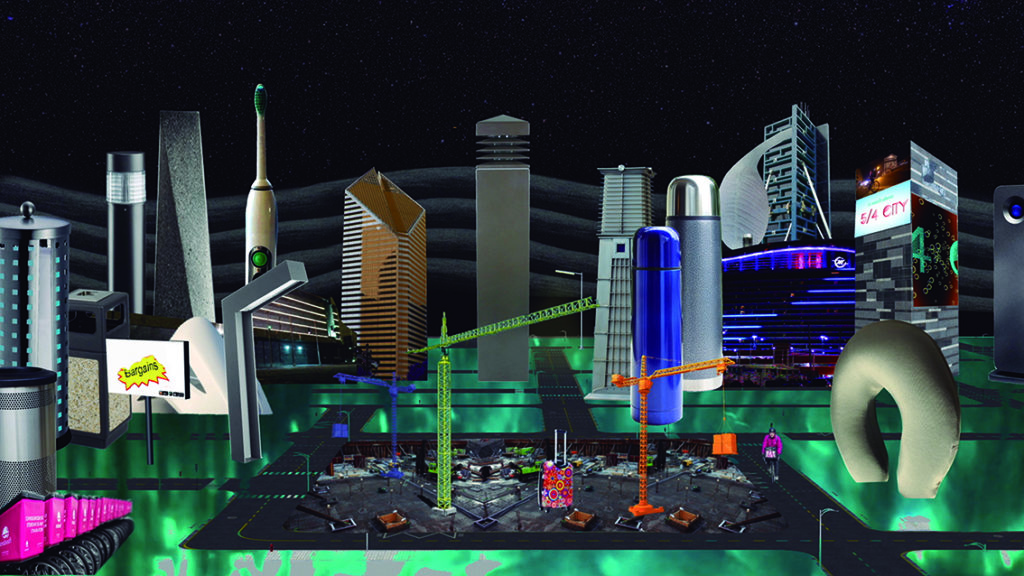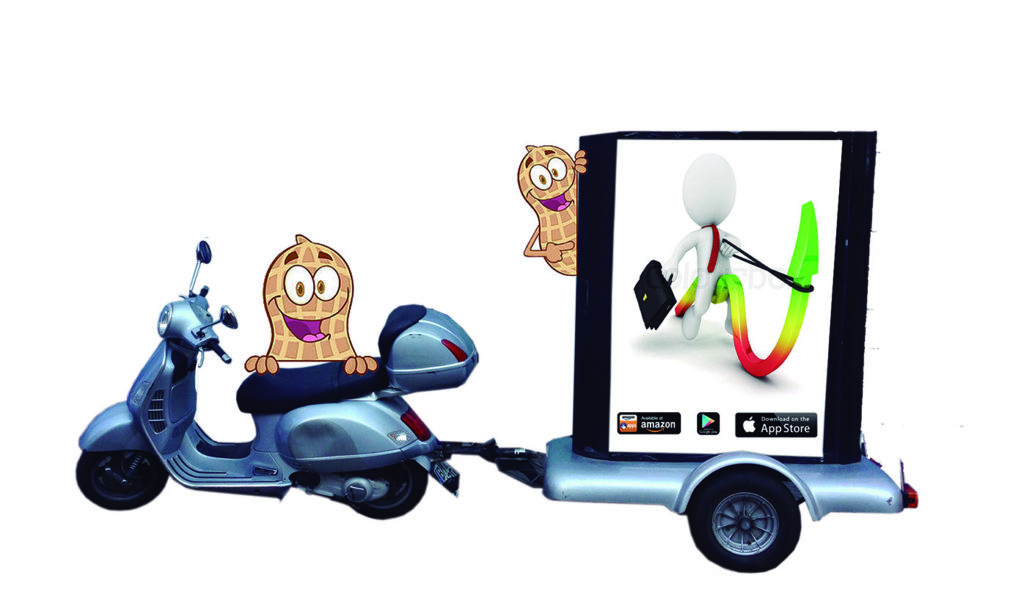INTERVIEW WITH JOSEPH VOGL BY MICHAEL AMSTAD AND MARTE EKNÆS
1. 5/4 CITY
Michael Amstad & Marte Eknæs: Can flexibility be described as a condition of the urban landscape in current times?
Joseph Vogl: Yes and no. Yes, if one were to interpret flexibility as the ability to work more and to forgo established ways of living, career paths and life goals, if one really were free to go astray. But no, if one pays attention to what’s actually happening in our cities. What we see happening in cities is, on the one hand, the destruction of habitat, of the biotope, by property prices, by the homogenisation of towns and also, if you like, by a production of confinement, of density. Moreover, it seems that cities are arming themselves, that in the service of flexibility they’re becoming militarised. People drive through towns in vehicles that had been developed for warfare, think of four-wheel drives, for example. So the destruction of habitats is one side of flexibility and the military armament of cities is the other. One might say that what is happening in the cities is a form of politics of occupation. Cities are occupied and become subject to the politics of occupation and with that, fundamentally, to a struggle for space.
MA & ME: How do we live on this unstable ground?
JV: I believe that it is possible to live on unstable ground, like one can live anywhere if the temperature is right, if the air pressure and humidity are right, i.e. if there is something like a climate. But only if one develops certain political virtues. The political virtues necessary in such a flexible climate are, firstly, a readiness for conflict, i.e. one somehow has to develop individualistic virtues. And secondly – and this is part and parcel of warfare – one has to simultaneously develop diplomacy. One has got to be willing to negotiate a peace deal at short notice. Militancy and diplomacy will be the living conditions, the ethological conditions, if you like. That is the kind of behaviour that one will necessarily have to adopt, were one to live in such territories. If we were to treat this seriously, also in reference to what is shown in the video, i.e. this fluctuating, unstable ground, and this permanent mobility, this readiness at any moment to declare one’s independence, one’s self-determination, then individuals have to be able to arm themselves, to arm and to rearm themselves. We already have what are basically imported military gadgets for this purpose, e.g. walkie-talkies – nowadays that’s a mobile phone; or equipment for carrying provisions – that would be the water bottle. A psychological, physical, and logistical armament is essential; and then one is ready to fend for oneself in this flexible world.
MA & ME: What things, structures, or concepts do you consider flexible? Can things or structures have an unstable core with a solid surface, or a flexible surface with a static content?
JV: Perhaps one ought to mention that there appears to be a contradiction between the concept of ‘thing’ and that of ‘flexibility’. In the field of perceptual psychology there have been, since the 1930s, texts that try to define the relationship between thing and medium. A thing here would be defined as a rigid coupling where things crystallise, whereas the medium is an oscillation. The concept of flexibility, or the flexible object, could therefore be a paradox. Perhaps it is better to always treat flexibility as a relative concept, meaning that (1) flexibility applies to that which moves faster than other things, and (2) applies to that which mobilises other things, other beings, other entities. Those are two definitions of flexibility and here I can see, if we’re serious for a moment, a formula emerging that is borrowed from Marx’s Capital. Flexibility would then be the translation of money into commodity into money. That would be a flexibility-constellation. And whatever no longer moves, whatever is no longer able to move within such a constellation, becomes superfluous and drops out, becomes a thing. Or, in the final analysis, becomes refuse. Anything that can’t stay afloat within this circulating sphere is rejected and turned into rubbish. And that applies to things just as much as it does to human beings.

Still from People Mover , 2017 by Michael Amstad and Marte Eknæs
2. 3/4 MAN
MA & ME: How is the everyday life of 3/4 MAN, as a worker in the gig economy, affected by the flexibility of economics?
JV: What characterises this flexible creature, this flexible human being, this flexible character, this flexible actor, who one way or another has got to be competent and be able to act in this gig economy, is self-capitalisation. That’s my first point. He’s got to understand all possible relationships between himself and others from the perspective of maximising profit. Sociology has a term for this now and that is ‘the enterprising self’. This means that ultimately all vital reserves, i.e. those pertaining to immediate life, biological life, physiological life, must also be viewed from the perspective of optimization, maximization, and efficiency increase. That’s the first challenge for a worker in the gig economy. Secondly, he’s got to be able to produce a great deal of anti-solidarity and, consequently, the antisocial. He’s got to be able to handle the disintegration of social milieus and social constellations. That’s an enormously important aspect in my opinion. He’s got to be able to become a behaviour atom for whom the concept of society might even collapse; for whom concepts like community may no longer describe anything. I could add a third point, one that may well cause us to feel melancholy: A worker in the gig economy must finally withstand the paradox of loneliness. The paradox of loneliness describes how in this world of hyper communication, of increasing communication, networking, and networking services, we remain isolated. That’s what I would call the paradox of loneliness and what is going to lend this peculiar form of existence its rather melancholy hue.
MA: So 3/4 MAN is always travelling, is always on the road and actually has little time for community?
JV: Exactly. That is what used to be called Welterfahrung – worldliness, being experienced in the ways of the world. And ‘experience’ in the dual sense in the German word [Erfahrung]: to experience something and, at the same time, to travel the world [fahren = to drive, to travel], e.g. to have adventures, to hire a ship, hail a carriage etc. But for someone within such a constellation, like a worker in the gig economy, going on wanderings also represents world loss. The more world I experience, the more world I lose. That is to say, I lose a hold on the world, a bond, and ultimately I lose world ownership.

The character 3/4 MAN from People Mover
MA: And that is the dissolution of private life and working life?
JV: The distinction becomes meaningless in a way. Defining the private and the not private, the working life and home life is becoming ever more difficult. In fact, it has reached a point where one can say that dissolving this distinction is a key stake. And if we persist with this distinction and preserve for ourselves a private sphere, in whatever form it might take, we would become reactionary; we’d be throwbacks to the bourgeois era. So what we’ve got now is an anti-citizen who emerged from the collapse of this distinction.
MA & ME: How do flexible strategies define the relationships between people and their context and/or their productivity? Does mobility make people more flexible?
JV: What then is the nature of people’s relationships in such constellations? Notwithstanding the fact that one can’t predict people’s behaviour and that I do believe in a flexibility beyond flexibility, namely that one can move flexibly through flexible constellations; i.e. settle down and nest somewhere. One mustn’t underestimate people. We might even see the emergence of new forms of resistance towards flexibility, people digging their claws into a place and refusing to let go, for example; or people building new nests. It’s perfectly conceivable that new living spaces will be invented that declare ‘I want to be stable. I want to be rigid’, that might even proclaim ‘I want to live in my own prison.’ Those things are by no means impossible, one simply can’t tell. If, however, one understands flexible relations in terms of utopia or dystopia, then we’ll find something like a generalised vampirism at the vanishing point, where everybody is connected to everybody else via an economy of opportunity. So if an opportunity arises, it must be seized immediately. Chance must be transformed immediately. Things like that will become unavoidable when one ascribes to a highly flexible, a highly risk-burdened life principle. What does that actually mean? It means that one is always moving through a generalised market system. The market place is the principle of movement within this constellation. And within this market principle, within this generalised vampirism, man is simultaneously market subject and market object; i.e. he purchases and is purchased, he is goods and buyer in one. It’s an interesting relationship, but also a matter of prostitution. In trying to imagine such a peculiar subject and his relationships, one is reminded of the beginnings of digitalisation and what springs to mind is Pac-Man. Pac-Man is someone who walks through a maze and uses every opportunity to vampirise – to eat and cannibalise. It’s tempting to say Pac-Man symbolises this peculiar existence. Flexibility thus also entails the ability to stand an enormous amount of suffering. I believe that suffering is the new challenge facing such an existence and its relationships. Possibly, one also needs to be able to make uniform one’s intellect, and do it strategically. The intellect must not be permitted to fall into contemplative traps, must not be permitted to meander along contemplative paths, but has to uphold its state of acceleration. That’s what I mean by the uniformity of the intellect.
MA: That entails an extreme state of wakefulness. One always has to be ready and set for re-action.
JV: Awake isn’t a word that I would use because there exists a state of wakefulness that is more wakeful than awake, and that is a trance. One needs to somehow develop the ability to exist in a trance-like state. Being awake means primarily nothing other than adhering to the heavy, worldly difference between sleep and wakefulness. Trance is something else; it is a wakefulness that forgets this difference. One stays awake even when one is asleep, or one somehow sleeps even when one is awake. I would say that there exists a wakefulness, or alertness, that has a trance-like character, and which in this environment can be manufactured naturally with all sorts of stimuli, drugs for example, and if not by drugs then by autosuggestion. But an entranced, high-speed movement through chaotic territories is, I believe, the specific alertness of the totally flexible type.
ME: Is this also a state in which one becomes less of an individual and more a part of the environment, where one absorbs without clear boundaries?
JV: Under trance one doesn’t think but reacts, and that means that we have a stimulus-reaction-relationship that in some way functions automatically. Reality here doesn’t appear as a disruptive influence, but as something that can and even must be processed immediately. The proper term for that peculiar state of suspension is therefore trance.
3. POSITIVE PEANUTS
MA & ME: Can you identify positive and negative aspects of flexibility?
JV: Basically it’s very simple. Flexibility in the first instance is a neutral term. The term ‘flexibility’ originally came from the materials science. Material is flexible. One can think of the invention or the discovery of rubber, for example. Rubber, and the synthetic material that was developed from it, opened up a new world, from the car tire to flexible linkage of objects to fetishes. That is why I would say it’s a neutral term, which, nevertheless, is fundamentally rooted in a certain history of industrialisation, and with that to a history of an everyday world that is bound to it. One can easily delve further into the question of how the introduction of rubber, of flexible materials changed our everyday world. That would be one side. If one really wanted to look at it in positive and negative terms, I’d say simply that flexibility is negative everywhere where it becomes an imperative. One mustn’t forget that we have got something like an imperative to be flexible, and each order, each dictate, each coercive measure is unquestionably negative. As for flexibility’s positive side, and we can also link this to rubber a little, we can say that with rubber, or elasticity, or agility in the political sphere there exists a promise of freedom. It promises freedom and one might even, perhaps, go so far as to claim that flexibility’s promise of freedom goes with a flexible freedom promise.

The characters Positive Peanuts from People Mover
ME: I want to talk more about the concept of material because that is how I came to the idea of flexibility in the first place. I wanted to use the form of sculpture to give materiality to an idea. In sculpture, flexibility is an undesirable quality. Flexible materials are often not durable and it is most likely that they will eventually become brittle, snap, or disintegrate. So I wonder, do you think we can apply this observation to the concept of flexibility in economics too?
JV: I’m not so sure about that. But we have a different, and much older term, also coming from the materials science, and that is the concept of stress. Stress describes the stress test for permanent material, airplane wings for example, or a car axle. When solid material is exposed to certain stresses, it cracks. With that in mind, one might say that flexibility is something that prevents stress, or specific forms of material fatigue. The more flexible, the more elasticated a material is, the more stress it can withstand. So the question would be, what’s the pathology of this mobile material? At what point do the load limits or catastrophes appear? And I think that in the field of the psychical apparatus it is recognised and described, and brought to the point where previously we had stress, and that is the burnout. That would be the pathology of the flexible, and perhaps I can add to this a second characteristic, which also applies to accelerated constellations, and that’s the crash. Burnout and crash are in a way the catastrophes of flexibility. Burnout on the part of the subject and crash on the part of systems, like the financial system that distinguishes itself by the high flexibility of its agents, business models, flow of capital, etc.
MA: And that’s the collapse of flexibility?
JV: Yes.
MA & ME: Then we want to ask you about flexibility and language. Can we say that there is an increased flexibility between words and their meaning today?
JV: It may well be that with a highly flexible form, a highly accelerated form of communication the relationship between words and meanings is diminished. And that it would show in the various forms of communication, in tweets on Twitter, for example, or on WhatsApp; i.e. in places where conciseness is the key criterion. But what is encouraged, what starts to grow when it becomes less about words and how they’re related to meaning? Or, and this is significant, when it’s less about words or sentences and how those are linked to interpretation? Interpretation is always a standstill, one gets stuck on a word, puzzles over its meaning, one gets stuck on a sentence, puzzles over its meaning, and this creates a hermeneutic puddle where movement at first ceases and is then directed inwardly. The word deepens, the sentence deepens, and meanings are being questioned. If, however, it’s no longer about immediate problems of understanding, but rather about troubleshooting problems of understanding, then the speech act, action becomes important. Meaning these speech acts provoke a high level of emotions and actions. I.e. when I say something I must already achieve a connection, either via an affect, an emotion, or via an action. And when the relationship between words and meanings is weakened, then the automatism of the continuation of speech acts in ‘speech acts to speech acts’, or ‘speech acts to action’, or emotions and affects strengthens. That’s one outcome, I’d say. ‘Tweet and tweet’, ‘tweet and emotion’, ‘tweet and action’ are, as it were, automatisms that are created. Communication automatisms are products, and that’s only possible when there is no hermeneutic resistance. One might add that it’s about the intensification of the role of slogans and passwords, like Trump’s ‘bad guys’ for example. So the aim is to provoke, with ever fewer words that signify less and less, certain action-reflexes or affects. That’s what I mean by the forging of automatisms. Such words can’t be called into question any longer; they’re semantically empty in a way and fit only to produce redundancies. And redundant communication, which is produced by communicative automatisms, is, I believe, the essence of this type of communication, or this speech form.
MA: And they would be triggers for emotions?
JV: Indeed, the point is to trigger. To speak means ‘to trigger’, whereas interpretation interrupts those triggering processes, interrupts automatic continuation.
ME: So this also has to do with the speed of an accelerated time in communication in order to trigger emotion or action?
JV: Yes, and that’s a problem of montage, as in movies. Different sequences have to be assembled in a certain way so that continuity, or a chain of actions, becomes foreseeable.
MA & ME: How does flexibility factor in our understanding of value?
JV: The most recent form of capitalism answers this directly. Capitalism has always questioned the source of value creation; that is, how can value be added? And a good example for this is platform-capitalism – think of Google, think of Airbnb, think of Uber. This type of capitalism distinguishes itself by a number of elements that are central to it. Firstly, the formation of capital, i.e. the accumulation of capital, detaches itself more and more from the responsibilities that come with physical capital on the one hand, and human capital on the other. Physical capital is cumbersome, remains chained to the earth. Human capital is cumbersome, it gets sick, it’s risk-susceptible. Both represent risks and thus a loss of yields. It’s profitable to be detached from physical and human capital and to leave this capital to its own devices. But that means that I become my own risk, I become responsible for my own car, but someone else profits from it. That’s the typical Uber driver. And Uber is completely unaffected by the risks that threaten the capital that drives around and that has to insure itself. That is how Uber generates surplus value. That’s one form of freeing oneself from the earthly burden of capital risks, and represents the first stage of platform-capitalism. Related to that is, secondly, that risks are transferred from above to below. The least wealthy carry the highest risks. One might even go further and say that the risks for those, who find themselves at the very bottom, become a real danger; a danger that can’t be assessed and that effectively becomes life-threatening, e.g. if one loses one’s life insurance, one’s pension scheme, one’s health insurance. Risks, which in the past I could assess and manage, somehow turn into manifest danger, mortal danger even. And the biggest risk with this model, in which risks are transferred from above to below, is that risks now become a threat. That’s a further point, and one that harks back to other aspects such as the question of value added, i.e. how can flexibility add value, and the search for new sources of value added. One such source is poverty. It’s possible to profiteer from poverty, and the American property market was a clear example of this. People who owned nothing more than a shabby home, had money lent to them so that they could continue to consume. Poverty thus becomes productive. You’ve got nothing left but a shabby flat with a couch in it, but they can still ask you to rent it out and that way make your poverty productive. Or, if you’ve not got a flat or a house, you might still have time on your hand and could, via these platforms, be invited to walk the neighbour’s dogs or do their shopping. Even spare time can be turned into money. The ability to make money from poverty is a further element of platform-capitalism. I could add a final aspect, one that everybody has come across and that is what is called the IKEA principle, or to be a ‘prosumer’. It means that when I purchase a product, I automatically contribute to the production of that product. That’s the IKEA principle. It means that part of what I invest when I assemble the product is turned into profit for the company. So those are the different aspects of this new form of capitalism. To summarise: capital increasingly detaches itself from the risks of earthly ties, from cumbersomeness; the transferral of risks from above to below; capitalisation from poverty, or the poorest in society; and, lastly, the ability to occupy and to capitalise from my spare time, which I didn’t even know I had and which I believed to be my own time.
MA: But how far can flexibility be stretched, or for how long can exploitation continue before the system runs aground?
JV: None of this is truly foreseeable. One thing that is surely correct to say is that flexibility and capital, which are closely linked (and that’s something that also lies behind all these questions), are always on the lookout for new resources. So even if labour power declines, due to automation for example, labour will still continue to be available for exploitation. Labour is necessary. But capitalism also needs consumers. It’s impossible to uphold the system if there’s no consuming. And that’s one of the central issues of this recent capitalism. So the question is not only ‘How do I produce goods?’ but also ‘How can I produce consumers?’ And that’s a brand new problem. So, the problem isn’t only ‘How can I reduce the cost of labour?’ (in Bangladesh, in India, in Africa, etc.) but ‘How can I tap into new resources for appropriation, such as land grabbing?’ And how can I produce more consumers when labour resources are shrinking? That’s the great difficulty for present-day capitalism. It could happen that the consumer at some point disappears altogether, which would spell the terrible end of capitalism.
MA: Can we already see signs that this is happening?
JV: There are signs and one finds them, for example, in the calls for a universal basic income. And it’s no longer only the extreme left, or trade unions, or social policy makers talking about it, but big companies are demanding it as well. It goes without saying that a state-guaranteed basic income above all serves to guarantee a dependable consumer. This is one area where new ideas are being formulated so as to combat the consumer’s ghostly disappearance.
ME: The fight against the disappearing consumer also connects back to the previous topic, that the language used in advertising and in politics is based more and more around trigger points to get an emotion or an action. Increasingly strong effects are needed to suck the last bit of consuming power out of the consumer. It is a kind of erosion.
JV: Quite. And what that means is that consumer behaviour becomes ever more molecular as a consequence. Using an iPhone has, to some extent, become permanent consumption. With each click the user simultaneously consumes and produces – he is what we call a ‘prosumer’. Information is produced in this way, for example. To push it even further, or to put it in Marxist terminology, those are new forms of exploitation that must be tapped into because without the mining of resources, which then can be further exploited, nothing functions. And capitalism, as we observe it in its most recent forms, has some rather intelligent methods for this.
ME: It seems to me that companies like Uber and Airbnb are not just stretching into new territory, but also taking up new space, which we didn’t even know existed.
JV: Capitalism has a great need for opening the most hidden doors. No one is permitted to stop outside the front door; the door has got to be opened so it can be made productive. And bear in mind that a business like Uber, which practically owns nothing more than an app, the entire enterprise is an app, is valued higher at the stock exchange than all of BMW. That shows just how productive such an economy is. There is an attempt to team up principles taken from the financial market, which itself has an interest in disconnecting itself from the burdens of obligating capital, to team up finance capital with certain new forms of production, such as the platform-economy. And Goldman Sachs is one of the biggest investors in Uber or Airbnb, for example. Furthermore, an Uber driver one has to learn to conceive of himself as a gadget, as someone who is available at any time for use by someone else. That’s what Uber are hoping to do, to transform human beings into gadgets: my iPhone, my television, my Uber.
MA & ME: Can you imagine a formula for flexibility?
JV: If by formula you mean developing a physics formula or a mathematical formula, then I’d say: Flexibility equals ‘I’ [Ich, the subject] multiplied by ‘loss of world’ divided by ‘time’. I think one has to let it stand in this erratic form. It’s bound, ultimately, to the formula of physical performance [Leistung]; and ‘performance’ is ‘work’ (i.e. ‘power’ plus ‘distance’) divided by ‘time’. So I am power; loss of world is distance; divided by time.

This interview was completed in Berlin 16.06.2017.
A part of it is included in the video work People Mover, 2017 by Michael Amstad and Marte Eknæs

Still from People Mover

